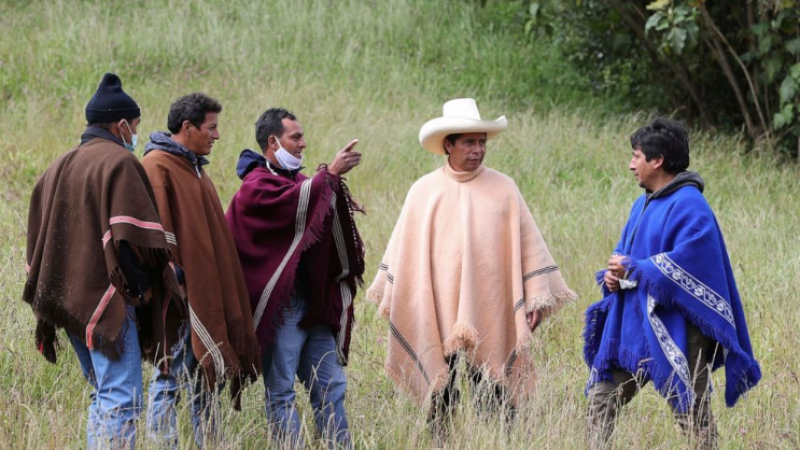
Peru: Peru's poor, including indigenous people and farmers who live high in the Andes and whose struggles have long gone unnoticed, rejoiced when Pedro Castillo was elected president last year.
His supporters hoped that Castillo, a populist outsider with modest beginnings, would alleviate their plight or at the very least end his anonymity.
However, during the 17 months that Castillo was in power before being ousted and detained, his supporters saw him as tackling the racism and discrimination they often face. He received criticism for his accent, for sporting the traditional hat and poncho, and for incorporating Native American slang at formal gatherings.
Also Read: first Super Bowl victory of Tom Brady's
A donkey, a Latin American symbol of ignorance, was seen protesting Castillo's administration wearing a hat similar to his. The Organization of American States sent observers on a recent mission to the bitterly divided and highly unequal nation to record the endless attacks.
But when Castillo stunned the nation on Wednesday by dissolving Congress, followed by his arraignment and arrest on charges of insurrection, he sought support among the poor as well as delivering on his promises to improve their lives. Ruined any chance. He committed political suicide hours before the third impeachment trial against him was to begin in Congress, a move that brought to mind some of the country's most undemocratic past.
Now that Castillo is in custody and the country is being led by his former vice president, Dina Boluarte, it remains to be seen whether she will be subjected to the same discrimination.
Peru's Vice President Boluaarte is also not a member of the country's political elite. He is a lawyer who previously worked for a government organization that issues identity documents. She grew up in an underdeveloped Andean town, speaks Quechua, one of the nation's indigenous languages, and, like Castillo, took a vow to "fight for someone".
In a report released last week, the Organization of American States said Peru has regions that "promote racism and discrimination and do not accept that individuals outside traditional political circles hold the presidency."
It has been said that this has insulted the prestige of the President.
Also Read: Xi Focus A brief timeline of Chinese presidents COVID19 responses
Boluaarte called for a compromise with lawmakers who ousted Castillo on grounds of "permanent moral incapacity" after taking office on Wednesday.
In the last six years, Peru has had six different presidents. It went through three a week in 2020.
Before winning a runoff election in June 2021, Castillo, a rural schoolteacher, had never held public office. He ran on promises to nationalize Peru's vital mining sector and rewrite the constitution, and he had strong support in the underdeveloped countryside.
Peru is the second largest exporter of copper in the world, and mining contributes to 60% of its exports and about 10% of its GDP. However, the coronavirus pandemic destroyed its economy, increasing poverty and wiping out ten years of gains.
Keiko Fujimori, the daughter of former strongman Alberto Fujimori, who is currently serving a 25-year prison sentence for murdering Peruvians by a secret military squad, was one of the best-known names in Peru's political class. Castillo defeated him by just 44,000 votes.
Castillo has been referred to by Keiko Fujimori's supporters as a "teruko" or terrorist, a term often used by the right to denigrate leftists, the disenfranchised, and rural citizens.
Once in office, Castillo faced two impeachment votes, more than 70 cabinet picks—some of which were accused of wrongdoing—in several criminal investigations ranging from influence peddling to plagiarism, and more.
While Castillo's lack of experience and allegations of corruption are valid, both were tainted by racism, "a constant in any Peruvian equation," according to Omar Coronel, professor of sociology at Peru's Pontifical Catholic University.
Also Read: Joe Biden's speech will be in Hindi! Advisory Commission accepts Indian leader's appeal
Anyone can be critical of his crimes, clumsiness and lack of political experience, Coronel said. Right-wing presidents have also been accused of corruption, so the way it was presented – because Castillo was from a small town with unique customs – is "a deeply racist discourse and tremendously hypocritical."
During these 17 months, according to Coronel, social media networks have been flooded with visceral racism.
Since Castillo's arrest, his few remaining supporters protested and blocked roads across the country. Additionally, they have gathered in front of the prison where Alberto Fujimori and he are being held.
Fernando Picatoste, a supporter of Castillo, said outside the prison on Friday, "They have called him all kinds of discriminatory words." It's a race-related problem. Congressmen, who are supposed to represent the entire country, have the audacity to insultthe president.